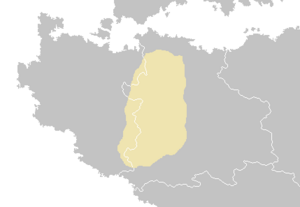Kartozan: Difference between revisions
No edit summary |
No edit summary |
||
| Line 24: | Line 24: | ||
The Kartozan were conquered by [[Orestes II]] in the mid-3rd Century BCE and thereafter underwent a process of Hellenization of which only the Karvelebi emerged with their language and culture largely intact. By the 6th Century CE most Kartozan languages had become extinct, a process that was almost certainly completed by the [[Burning Plague]] in the 9th Century. Following the devestation most of western Ruvelka was depopulated of Hellenic speaking people and replaced by ethnic Ruvelkans migrating from the Kurilla and Matra Mountains. Sometime between the [[Makedonian Khanate]] and the [[Rioni Union]], the Karvelebi language evolved past the point of intelligibility with the rest of the Kartozan language family. Efforts to decypher ancient Kartozan records and inscriptions remain an ongoing process in universities across Ruvelka and Syara. | The Kartozan were conquered by [[Orestes II]] in the mid-3rd Century BCE and thereafter underwent a process of Hellenization of which only the Karvelebi emerged with their language and culture largely intact. By the 6th Century CE most Kartozan languages had become extinct, a process that was almost certainly completed by the [[Burning Plague]] in the 9th Century. Following the devestation most of western Ruvelka was depopulated of Hellenic speaking people and replaced by ethnic Ruvelkans migrating from the Kurilla and Matra Mountains. Sometime between the [[Makedonian Khanate]] and the [[Rioni Union]], the Karvelebi language evolved past the point of intelligibility with the rest of the Kartozan language family. Efforts to decypher ancient Kartozan records and inscriptions remain an ongoing process in universities across Ruvelka and Syara. | ||
[[Category:Syara]][[Category:Ruvelka]] | [[Category:Ancient Syara]][[Category:Ruvelka]] | ||
Revision as of 15:52, 2 October 2021
 General area of Kartozan habitation | |
| Languages | |
|---|---|
| Kartozan languages |
The Kartozan were an ancient people who inhabited western Ruvelka during antiquity. They spoke the Kartozan languages, of which only the Karvelebi language survives. The Karvelebi were the only tribe of the Kartozan to maintain their own distinct identity during the reign of the Makedonian Empire, and today primarily reside within Zemplen.
The origin of the Kartozan is uncertain. Connections with the Segelen, the native inhabitants of Syara have been proposed over the course of several centuries but have never been proven. Suggestions of a connection with the Uralic-speaking Ruvelkans and the Erani-Eracurans have also been proposed but have not been validated. Most historians hold that the Kartozan were likely the first, or among the first, native inhabitants of western Ruvelka. First records of the Kartozan language appear in the 6th Century BCE, but very little remains of their literary work. The Kartozan had contacts with most of the major powers and entities of the Syaran-Ruvelkan Peninsula, including the Kydonian League, Ancient Makedon, and the various Ruvelkan mountain kingdoms. Like their Ruvelkan counterparts the Kartozan were not a unified people, but a network of tribes and smaller kingdoms between the Kurilla Mountains and the Galanian Valley.
The Kartozan were conquered by Orestes II in the mid-3rd Century BCE and thereafter underwent a process of Hellenization of which only the Karvelebi emerged with their language and culture largely intact. By the 6th Century CE most Kartozan languages had become extinct, a process that was almost certainly completed by the Burning Plague in the 9th Century. Following the devestation most of western Ruvelka was depopulated of Hellenic speaking people and replaced by ethnic Ruvelkans migrating from the Kurilla and Matra Mountains. Sometime between the Makedonian Khanate and the Rioni Union, the Karvelebi language evolved past the point of intelligibility with the rest of the Kartozan language family. Efforts to decypher ancient Kartozan records and inscriptions remain an ongoing process in universities across Ruvelka and Syara.